Hawthorne Surname Ancestry ResultsOur indexes 1000-1999 include entries for the spelling 'hawthorne'. In the period you have requested, we have the following 185 records (displaying 81 to 90): Single Surname Subscription | | | Buying all 185 results of this search individually would cost £974.00. But you can have free access to all 185 records for a year, to view, to save and print, for £100. Save £874.00. More... |
These sample scans are from the original record. You will get scans of the full pages or articles where the surname you searched for has been found. Your web browser may prevent the sample windows from opening; in this case please change your browser settings to allow pop-up windows from this site. Electors for Leamington Priors
(1868)
A poll for the election of two knights of the shire to represent South Warwickshire was held 24 November 1868: the candidates were Lord Hyde (H.), Sir R. N. C. Hamilton (H.), H. C. Wise, Esq. (W.) and John Hardy, Esq. (H.). This poll book lists all those electors who voted; the county franchise included not only male freeholders of 40s a year, but also £10 copyholders and long-leaseholders, and £50 short-leaseholders and tenants. In addition, where no vote was cast the elector's number and name are given, the name in italics. The names are arranged by polling district and then by parish or township. Freeholders holding requisite property in a district are listed there, but might well reside elsewhere. The right-hand column indicates how each man voted. HAWTHORNE. Cost: £4.00.  | Sample scan, click to enlarge
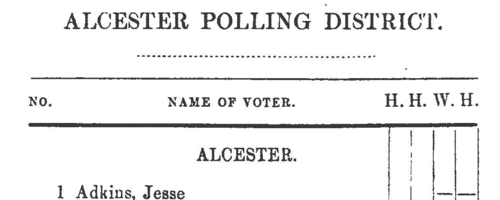
|  Outstanding soldiers of the Grenadier Guards
(1860-1870) Outstanding soldiers of the Grenadier Guards
(1860-1870)
The 1st (or Grenadier) Regiment of Foot Guards was in three battalions. The 1st battalion returned from Portugal in 1828, and was based at Wellington Barracks. The second battalion returned from Canada in 1842, and was based at Chelsea Barracks. The third battalion returned from the Crimea in 1856, and was at the Tower of London. Each year outstanding soldiers of the regiment were chosen for good conduct medals and gratuities: these are listed here. There were two lists, one for men recommended for the Good Conduct Medal without a gratuity, and one for gratuities - £5 to a private, £10 to a corporal, and £15 to a serjeant. Both lists are indexed here, and each gives rank, name, regimental number, date of recommendation and date of issue. (The sample scan is from the 105th foot)HAWTHORNE. Cost: £8.00.  | Sample scan, click to enlarge
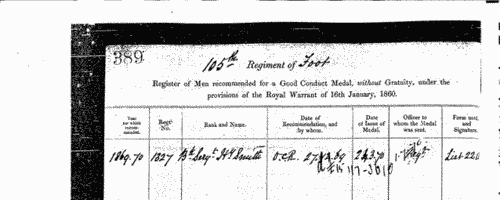
| Infants in Banbridge Workhouse: County Down
(1872)
Return, “with Christian and Surname of each, of Infants Born in Irish Workhouses, or Admitted thereto when Healthy under Twelve Months Old, and attempted to be Reared therein during the Years 1872 to 1874, showing what has since become of them”. The returns from each poor law union workhouse give: Christian and Surname of Infant Born in the Workhouse, or Admitted Healthy, under Twelve Months; Year; and whether discharged, healthy, in hospital, or dead. HAWTHORNE. Cost: £6.00.  | Sample scan, click to enlarge
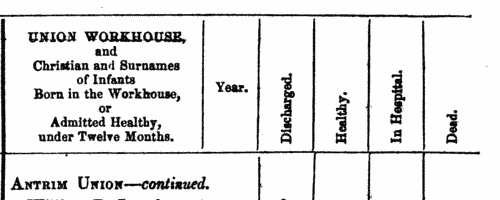
| Infants in Banbridge Workhouse: County Down
(1873)
Return, “with Christian and Surname of each, of Infants Born in Irish Workhouses, or Admitted thereto when Healthy under Twelve Months Old, and attempted to be Reared therein during the Years 1872 to 1874, showing what has since become of them”. The returns from each poor law union workhouse give: Christian and Surname of Infant Born in the Workhouse, or Admitted Healthy, under Twelve Months; Year; and whether discharged, healthy, in hospital, or dead. HAWTHORNE. Cost: £6.00.  | Sample scan, click to enlarge
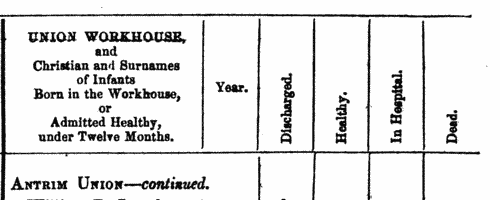
| Infants in Lurgan Workhouse, County Armagh
(1874)
Return, “with Christian and Surname of each, of Infants Born in Irish Workhouses, or Admitted thereto when Healthy under Twelve Months Old, and attempted to be Reared therein during the Years 1872 to 1874, showing what has since become of them”. The returns from each poor law union workhouse give: Christian and Surname of Infant Born in the Workhouse, or Admitted Healthy, under Twelve Months; Year; and whether discharged, healthy, in hospital, or dead.
HAWTHORNE. Cost: £6.00.  | Sample scan, click to enlarge
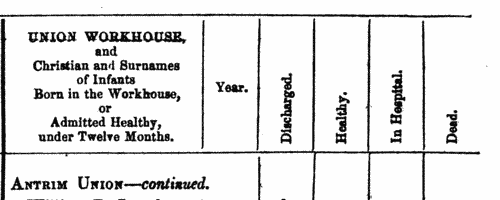
| Freeholders in county Armagh
(1873-1875)
Owners of an acre or more, whether resident there or elsewhere: with their addresses; the acreage; and a valuation of the land. The survey commenced in February 1873, the last returns being received in November 1875.HAWTHORNE. Cost: £4.00.  | Sample scan, click to enlarge
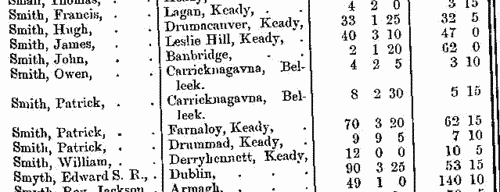
| Freeholders in county Carlow
(1873-1875)
Owners of an acre or more, whether resident there or elsewhere: with their addresses; the acreage; and a valuation of the land. The survey commenced in February 1873, the last returns being received in November 1875.HAWTHORNE. Cost: £4.00.  | Sample scan, click to enlarge
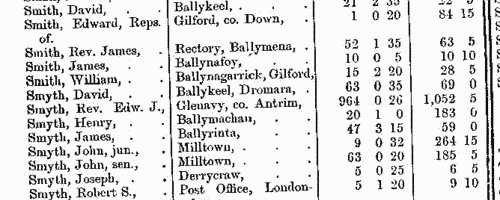
| Mathematics students at Cambridge University
(1877)
Tripos lists or examination results for the year, arranged by class (Wranglers, Senior Optimes and Junior Optimes), and within each class in order of score in the examination (the names of candidates with equal scores are bracketed together, with the word 'AEq.'). Each student's surname and college is given: this list was printed in 1890, and was annotated with asterisks to show which students had subsequently become fellows of the university; and with footnotes showing those who became headmasters, &c., elsewhere. Winners of Dr Smith's Mathematical Prizes are marked (1) senior, (2) for junior. The Greek letter alpha is affixed to the names of those students who had gained first class results in the Classical Tripos; beta to those entered in the second class; and gamma to those entered in the third class. These lists are particularly useful in identifying for an individual the fellow-students who will have attended lectures with him; and, where from the college, are likely to have been even more closely associated by having been under the same supervisor. (The sample scan is from the start of the Mathematics Tripos list for 1770)HAWTHORNE. Cost: £6.00.  | Sample scan, click to enlarge

|  Men of the 13th Regiment of Foot (1st Somersetshire - Prince Albert's Light Infantry) fighting in South Africa
(1877-1879) Men of the 13th Regiment of Foot (1st Somersetshire - Prince Albert's Light Infantry) fighting in South Africa
(1877-1879)
What is commonly called the Zulu War Medal was awarded to those British soldiers who fought in a series of conflicts in southern Africa from 1877 (the Kaffir War) through to 1879 (the Zulu War). In 1880 the various units submitted returns of the officers, non-commissioned officers and men 'entitled to the Medal for Military Operations in South Africa during 1877-8-9' and these 'medal rolls' are now in the National Archives. The returns are made with the information arranged in twelve columns:
1. Rank and name
2. Regimental number and rank at the time the medal was earned
3. Whether in possession of medal for previous wars
4. Whether engaged against the Gaikas, Galekas and other Kaffir tribes 1877-8
5. Whether engaged against Pokwane 1878
6. Whether engaged against the Griquas 1878
7. Whether engaged against the Zulus 1879
8. Whether engaged against Sekukuni as set forth in Par. 2. G. O.
9. Whether engaged against Moirosi's stronghold
10. Entitled to medal without clasp under Par. 4.
11. Serving with regiment, depot, dead, discharged, deserted, &c.
12. Notes and cross-references to the Adjutant-General's medal lists.
WO 100/46.
HAWTHORNE. Cost: £8.00.  | Sample scan, click to enlarge
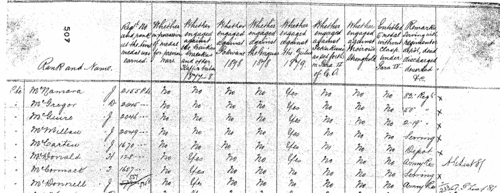
|  Men of the 4th Regiment of Foot (The King's Own Royal) fighting in South Africa
(1877-1879) Men of the 4th Regiment of Foot (The King's Own Royal) fighting in South Africa
(1877-1879)
What is commonly called the Zulu War Medal was awarded to those British soldiers who fought in a series of conflicts in southern Africa from 1877 (the Kaffir War) through to 1879 (the Zulu War). In 1880 the various units submitted returns of the officers, non-commissioned officers and men 'entitled to the Medal for Military Operations in South Africa during 1877-8-9' and these 'medal rolls' are now in the National Archives. The returns are made with the information arranged in twelve columns:
1. Rank and name
2. Regimental number and rank at the time the medal was earned
3. Whether in possession of medal for previous wars
4. Whether engaged against the Gaikas, Galekas and other Kaffir tribes 1877-8
5. Whether engaged against Pokwane 1878
6. Whether engaged against the Griquas 1878
7. Whether engaged against the Zulus 1879
8. Whether engaged against Sekukuni as set forth in Par. 2. G. O.
9. Whether engaged against Moirosi's stronghold
10. Entitled to medal without clasp under Par. 4.
11. Serving with regiment, depot, dead, discharged, deserted, &c.
12. Notes and cross-references to the Adjutant-General's medal lists.
WO 100/46.
HAWTHORNE. Cost: £8.00.  | Sample scan, click to enlarge
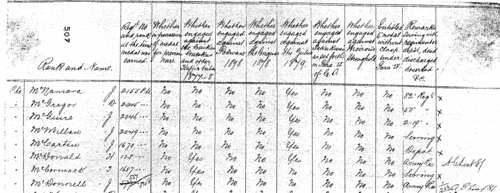
|
Research your ancestry, family history, genealogy and one-name study by direct access to original records and archives indexed by surname.
|













